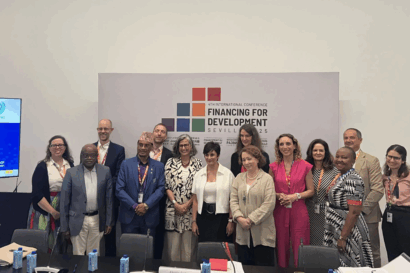As momentum builds towards the Financing for Development conference in Seville, policymakers are gathering at the UN headquarters in New York today for a Special Meeting on International Cooperation in Tax Matters. One of the two key themes of the meeting is advancing gender inclusivity through tax policy design and implementation—a goal that, while many support in principle, requires a more effective framework to achieve.
For decades, the dominant framework for understanding gender in tax policy has been the distinction between explicit and implicit bias. This approach has helped uncover how tax systems can unfairly affect women, either through direct discrimination in law (explicit bias), or through seemingly neutral provisions that have unequal effects due to entrenched gender roles (implicit bias). While this framework has advanced the conversation, a recent policy brief by Caren Grown and Giulia Mascagni argues that we must now go beyond this framing to make meaningful progress.
From Tax Bias to Broader Fiscal Justice
The authors argue that the implicit-explicit bias lens is now too narrow and potentially misleading for guiding effective reform. Explicit biases—like tax codes that treated wives differently from husbands—have largely been addressed in many countries. What remains are complex, structural inequalities that can’t be fixed by tweaking tax provisions alone. Moreover, no guidance exists to identify and detect an “implicit” bias, so when tax solutions to ‘implicit’ biases are put forward, they often make for ineffective and inefficient tax policy.
For example, consider the widely debated “tampon tax”—the application of VAT to menstrual hygiene products. Advocates in several countries have successfully campaigned to remove this tax on the grounds that it represents an implicit bias against women. Yet evidence suggests that such reforms often benefit higher-income women more than those in poverty, while reducing critical tax revenues that could be used to directly provide these products to those who need them most.
This and other examples show the need to embed tax reform within a broader fiscal policy agenda—one that takes seriously the interconnectedness of tax, spending, and power.
What Does a Feminist Fiscal Approach Look Like?
The new approach starts by defining the actual policy goal—say, increasing women’s labour force participation, or improving access to childcare—and then asking what combination of tax, spending, and regulation is best suited to achieving that goal. Sometimes, tax tools will be the right lever; other times, better public services or spending policies will be more effective.
The main objective of the tax system is to raise revenue to support public expenditure on country priorities, such as increasing female labor force participation, supporting the establishment of care services for children and the elderly or mitigating and adapting to climate change. The way that revenue is raised has implications for gender equality. A progressive tax agenda will maximise revenue while preserving efficiency and promoting equity, as women are disproportionately represented among small firms and low-income earners. Specific recommendations include:
- Strengthening taxes on income and wealth, including on property, capital gains, and inheritance
- Maintaining consumption taxes like VAT on the broadest possible base to maximise revenue generation, while addressing poverty and gender equity through spending;
- Eliminating tax exemptions and expenditures that mostly benefit the wealthy and large companies
- Improving enforcement and compliance in ways that do not disproportionately burden low income women or small businesses.
Tax Administration Matters for Women
Much of the debate has focused on tax policy, but tax administration is equally important for gender equality. Women often face greater barriers than men when interacting with tax authorities—due to complex systems, lack of support, lack of information, or even harassment. Building more effective tax systems means improving facilitation, reducing compliance costs, and ensuring fair treatment during enforcement for women and men.
There’s also growing interest in the role of women within tax administrations. Evidence from Uganda and Ethiopia suggests that female tax officials often outperform their male counterparts on integrity and effectiveness, but systemic barriers limit their access to leadership roles. Empowering women in tax administrations may contribute to more inclusive and responsive systems, but this impact is not automatic.
A Framework Fit for Purpose
Today’s UN ECOSOC meeting is an opportunity to move beyond simplistic notions of bias against women in tax systems that traps policymakers into a narrow set of unproductive issues. It’s time to embrace a broader, bolder fiscal agenda that, with better gender-disaggregated data to inform it and the political will to implement it, can truly benefit women in the ways they need.



